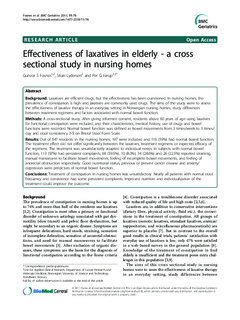Effectiveness of laxatives in elderly - a cross sectional study in nursing homes
Journal article, Peer reviewed
Published version

Åpne
Permanent lenke
http://hdl.handle.net/11250/2620865Utgivelsesdato
2011Metadata
Vis full innførselSamlinger
Sammendrag
Background
Laxatives are efficient drugs, but the effectiveness has been questioned. In nursing homes, the prevalence of constipation is high and laxatives are commonly used drugs. The aims of the study were to assess the effectiveness of laxative therapy in an everyday setting in Norwegian nursing homes, study differences between treatment regimens and factors associated with normal bowel function.
Methods
A cross-sectional study. After giving informed consent, residents above 60 years of age using laxatives for functional constipation were included, and their characteristics, medical history, use of drugs and bowel functions were recorded. Normal bowel function was defined as bowel movements from 3 times/week to 3 times/day and stool consistency 3-5 on Bristol Stool Form Scale.
Results
Out of 647 residents in the nursing homes, 197 were included and 116 (59%) had normal bowel function. The treatment effect did not differ significantly between the laxatives, treatment regimens or expected efficacy of the regimens. The treatment was unsatisfactorily adapted to individual needs. In subjects with normal bowel function, 113 (97%) had persistent complaints; 68 (59.5%), 10 (8.0%), 34 (28.6%) and 26 (22.5%) reported straining, manual manoeuvre to facilitate bowel movements, feeling of incomplete bowel movements, and feeling of anorectal obstruction respectively. Good nutritional status, previous or present cancer disease and anxiety/depression were predictors of normal bowel function.
Conclusions
Treatment of constipation in nursing homes was unsatisfactory. Nearly all patients with normal stool frequency and consistence had some persistent complaints. Improved nutrition and individualization of the treatment could improve the outcome.
